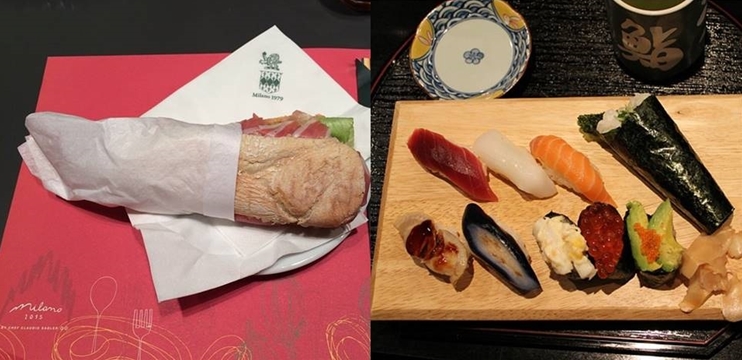
(Photo: Milano-style Sandwich / Edo-mae Sushi / Pixabay)
< Profile of Speakers >
◆ Marco Crepaldi
A young socio-psychologist in Milan, Italy. Founded the web site “Hikikomori Italia” to respond to the increase of hikikomori in Italy, presiding liaison meetings of about 170 families. Refer to his article “What hikikomori is and what Isn’t” which was translated also in Japanese and raised big reactions.
◆ Vosot Ikeida
A middle-aged hikikomori in Tokyo, Japan. Has been a hikikomori intermittently for over 30 years. Refer to his career “Hikikomori Horoki (Odyssey of Hikikomori)“(Japanese). Founded “VOSOT Project”. What he speaks out here is his personal opinion and nothing to represent the Hikikomori News.
Continued from Round 6
◆
Vosot:
As for the relation between hikikomori and national character, we can think this kind of things as well.
It may be just a prejudicial image, but in general, Italians are said to be the people who enjoy life vigorously.
You love to eat, love to sing, love to love, and so on.
However, it is obvious that every Italian individual is different about that aspect, and there must be many “exceptional” Italians who cannot keep up with the average Italian mode of enjoying life vigorously.
Now I think, my old friend Giuseppe in Palma, who was a hikikomori 30 years ago, was one of them.
Marco:
Every Japanese individual is different, so is Italian.
Vosot:
Exactly. Now, it is a good idea to think critically of the hypothesis I mentioned before; “In Europe, the south has more hikikomori, and the north has less.”
The other day I watched a TV program about “Open Dialogue” in the northwest Finland. In Japan, a lot of people talk about the possibility of Open Dialogue these years. Watching it, I found some people being in the condition of hikikomori there.
They were not called “hikikomori”, and it must be noted that the objects of Open Dialogue were patients of schizophrenia, but it is true that they were shutting themselves in.
Marco:
What are you going to state?
Vosot:
I could not help associating thoughts with the fact that in northern countries it is more common to shut oneself in, because they have longer winters, longer nights, and colder temperature and so on.
I imagine that if everybody is shutting oneself in, it is difficult to identify a hikikomori as hikikomori, just like it is difficult to find a certain wood in a forest.
Marco:
It may be so. But, so what?
Vosot:
Now, getting back to Italy. Italy is a country of sunshine, and people enjoy lives outside.
It is not common to shut oneself in.
I wonder if that was the reason a hikikomori was easy to be found and Italy became the first country in Europe where the hikikomori phenomenon emerged.
In other words, the thing is just that many hikikomoris are still covered, or not discovered yet, in the northern Europe. And only the result of it is “The north has less hikikomori”.
What would you think of my novel hypothesis?
Marco:
It is a hypothesis, but I still think that we don’t have enough data to draw conclusions.
We could look at everything from different point of views, for example, I could say this way…
“In the North Europe, it is easier to discover a hikikomori than in Italy, because we are used to live with our parents for a long time and could be difficult to distinguish hikikomori from “bamboccioni”. Conversely, in the North Europe, they are used to leave parents’ house early, so a male who continues to live with his parents can be easily identified as a hikikomori.”
Vosot:
Oh, that’s marvelous.
Marco:
At the same time, as you said previously, there are a lot of hikikomoris who live alone in Japan. This seems almost impossible in Italy, where you have difficulties to leave parents’ house even if you have a good job of high income. But there are a lot of offside students who could be potential hikikomoris.
It’s really difficult for me to make a hypothesis about it, because there are too many varieties.
Personally I believe that in Europe it’s too early to think about that, because we are just at a stage where we have to discover the phenomenon, and not to count it.
In Japan you are far ahead on this.
Vosot:
It makes sense. I am convinced.
Continued to Round 8
To the Japanese Version of Round 7
——————————
紙面版ご購入はこちらをクリック
更新情報が届き便利ですので、ぜひフォローしてみて下さい!
Twitter
Facebookページ

